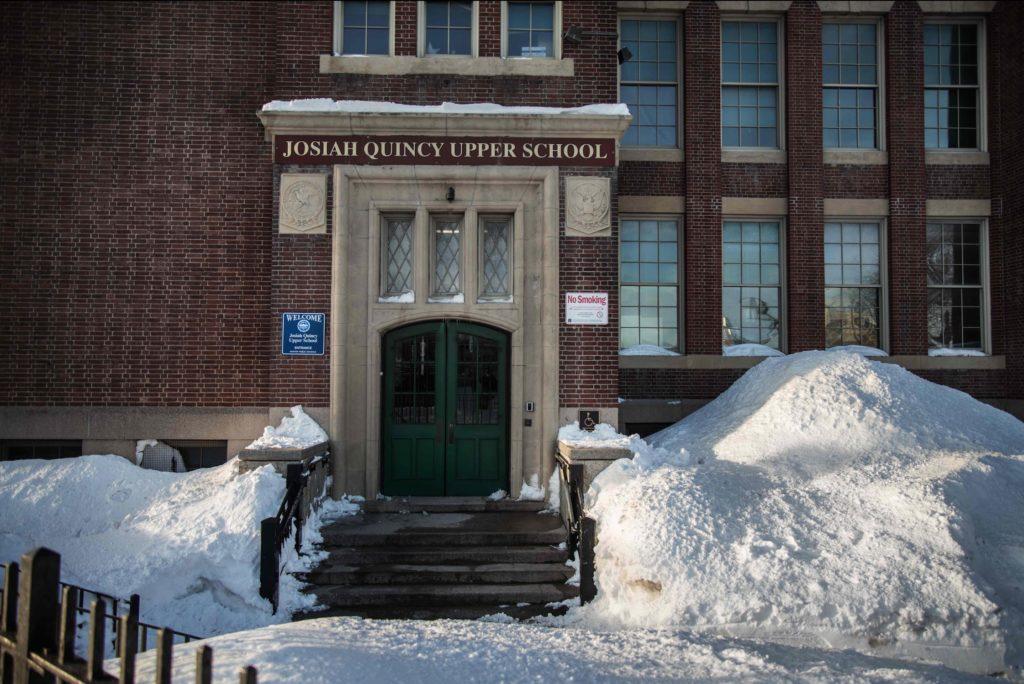By Audrey Cooney, news correspondent
Boston Public Schools (BPS) and city officials are taking action to deal with the unusually high number of snow days schools have been forced to take this year.
“Boston has experienced historic snowfall in the last three weeks resulting in an unprecedented number of school cancellations,” Denise Snyder, a spokesperson for (BPS) Superintendent John McDonough, said in an email to The News. “This winter, Boston Public Schools has closed school eight times, seven of which were for snow and one for extreme cold. We recognize that more winter is ahead of us, and we’re actively engaging with the mayor’s office and the heads of unions that make up our district to identify how to best address make-up days.”
Schools have not been closed this many days in one season for at least 12 years, with transportation issues accounting for the most difficulties in keeping schools open, according to Richard Stutman, president of the Boston Teachers Union (BTU).
“Even sometimes if the weather isn’t too bad, the buses can’t maneuver around the corners of different streets, so that is a problem,” Stutman said.
While the school year was originally scheduled to end on June 19, it has now been extended to June 30, the last day on the teachers’ contracts. Officials must make up for lost class time by alternate means, which are still under discussion. Plans must also allow for the possibility of more snow, which could result in even more lost school days.
According to Snyder, Mayor Martin J. Walsh has stated that school will be held on two county holidays, Evacuation Day on March 17 and Bunker Hill Day on June 17. However, the BTU must still vote on these dates.
Possible solutions all come with their own drawbacks. Teachers and other schools workers may disagree on which days to hold school, which complicates the issue.
“There will be pressure on us to cancel April vacation; there will be pressure on us to go to school six Saturdays,” Stutman said. “[Union] members will not want to do that, families will not want to do that.”
However, missing too many days of school can disrupt both children’s education and teachers’ lesson plans.
“It messes things up because people prepare to do a whole week of work, and instead it might be two days here and three days the next week,” Stutman said.
The broken schedules force teachers to rearrange how they organize their lessons, while the gap in school-time can potentially derail how effectively students learn, according to Stutman.
Jacqueline Reis, information specialist at the Massachusetts Department of Elementary and Secondary Education, is trying to avoid a negative impact on students.
“We’re hoping that it won’t affect changes in curriculum,” Reis said. “It might change when the lesson’s given, but what we’re hoping in this point in the school year is that days that were missed will be made up, and material meant to get covered will still be covered … The idea is that these days will be eventually made up, and so hopefully there won’t be a negative impact from that. It is harder in that it interrupts the momentum, but hopefully it will all be made up.”
No mention has been made of changing the number of days in the 180-day school year. According to the official guidelines of the Massachusetts Department of Elementary and Secondary Education, that requirement can only be waived if schools are forced to close after March 31 – and only if there have already been at least five make-up days.
In his weekly online update on the Department of Elementary and Secondary Education website for the week of Feb. 13, Mitchell Chester, commissioner of Elementary and Secondary Education, wrote: “Although the commissioner has authority to reduce the student learning time requirements in extraordinary circumstances, that has always been a last resort … If the remainder of the winter yields continued weather emergencies, ESE will reevaluate whether there is a need to grant waivers to individual districts, but the agency does not expect to issue a general, statewide waiver.”
In BPS, elementary school students are required to receive 900 hours of “structured learning time” per year, according to the policies of the Department of Elementary and Secondary Education. Secondary school children must be given 990 hours and kindergarteners 425.
According to Chester’s update, some students have been sent home in advance of snow storms with “blizzard bags” containing assignments meant to help fill the gaps in class time during the storms. However, this cannot entirely compensate for lost days or count toward the required number of classroom hours.
“For this approach to count toward the student learning time requirements, school districts must ensure that such work is structured learning time, is substantial and has appropriate oversight and teacher involvement,” Chester wrote. “To the degree that learning outside of the school setting may rely upon parental involvement or access to technology, districts must also account for the widely varying circumstances in students’ homes.”
Walsh has said that 14 “family centers” remain open even during days with no school in case of emergencies. There, independent childcare providers and literacy educators can try to fill the gaps in the students’ regular curricula.
Reis believes that this year’s unprecedented snowfall and the ensuing complications should push school officials to better prepare for future school years.
“We do hope that this will inform discussions of next year’s school calendar,” Reis said. “For a few years now, the school board has been asking school districts to start the school year before Labor Day and to have a March vacation instead of April.”
Photo by Arzu Martinez




















